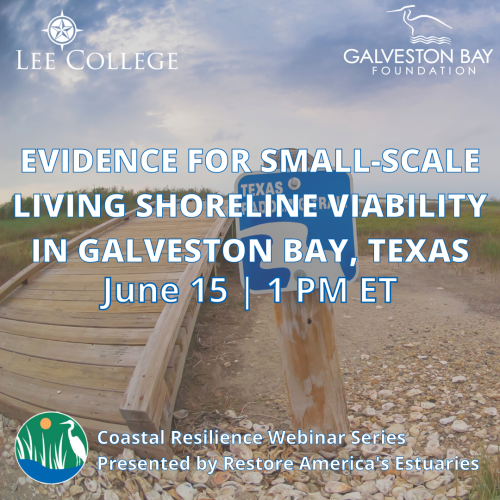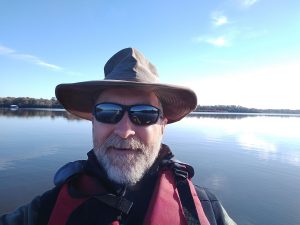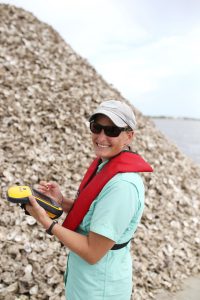
- This event has passed.
Evidence for Small-scale Living Shoreline Viability in Galveston Bay, Texas
June 15, 2022 @ 1:00 pm - 2:00 pm
Free
In response to coastal subsidence and erosion throughout the lower Galveston Bay watershed, a significant amount of shoreline habitat restoration has been implemented in these estuarine environments in an effort to restore and stabilize previously degraded shorelines and associated aquatic habitats. Common approaches include shoreline armoring using materials such as sheet pile bulkheads or other artificial materials, some of which have marginal to negative ecologic function and can complicate stability of adjacent shorelines. Alternative approaches can incorporate more natural landscape strategies and biologic processes that mimic endemic shoreline structure and habitat (e.g., Living Shorelines). Anecdotal evidence suggests that Living Shorelines (LS) are an ecologically beneficial option for erosion control and property protection. However, much of the scientific data regarding ecologic function come from larger scale habitat restoration projects rather than smaller, privately owned sites reflective of the majority of LS sites along the upper Texas coast.
For this ongoing study, data was collected at three LS sites to attempt to quantify potential benefits of small-scale restoration projects within the lower Galveston Bay system. This data was compared to natural reference sites and traditionally armored sites near each project site to compare shoreline stability, biologic function across plant and animal communities, and measure potential stressors including sediment heavy metals and organic pesticide sequestration. The data suggest that while the restored sites are similar to natural sites across a number of the ecologic community characteristics measured, time may be required before community development achieves ecologic parity with comparable natural sites. These results suggest that living shorelines have important implications for shoreline habitat function and
resiliency. In light of climate change, relative sea level rise, and increasing development pressure along waterfront properties, this data will be useful for restoration managers considering applicable techniques for future projects in these dynamic coastal environments.
Learn more about their project. Check out the Galveston Bay Shoreline Protection Model Map Viewer.
 Jim Dobberstine, Faculty – Lee College
Jim Dobberstine, Faculty – Lee College
Jim’s 30-year professional career is increasingly focused on strengthening the connections between science, policy, and public awareness. Jim teaches Environmental Science at Lee College (Baytown, TX), and is engaged in grant-funded ecosystem studies in the Galveston Bay Estuary with his students, the results of which have been featured through organizations including Restore America’s Estuaries (RAE), among others. These include gathering data to be used for adaptive management of ecosystem restoration in aquatic habitats in lower Galveston Bay, comparing the functional aspects of the biologic communities across different large-scale estuarine habitat restoration designs and studying the biologic community characteristics associated with small-scale shoreline restoration (Living Shorelines) in comparison to natural reference marshes and traditionally armored (bulkhead) shorelines in estuarine and freshwater ecosystems. (email: jdobberstine@lee.edu)
 Haille Leija, Habitat Restoration Manager – Galveston Bay Foundation
Haille Leija, Habitat Restoration Manager – Galveston Bay Foundation
Haille has a B.S. in Ocean and Coastal Resources from Texas A&M University at Galveston and a M.S. in Coastal Zone Management from Nova SE University. She has over 10 years of experience in natural resource management and habitat restoration. Her work experience includes a regulatory internship with the U.S. Army Corps of Engineers Galveston District, environmental education and non-profit work in Florida, and working in the private industry as an environmental consultant in Texas. Haille has worked with the Galveston Bay Foundation since 2015 and currently serves as the Habitat Restoration Manager. She oversees the Oyster Shell Recycling Program and manages the Foundation’s oyster reef restoration efforts as well as living shoreline projects. (email: hleija@galvbay.org)
